
"Lili Marleen" is a German love song that became popular during World War II throughout Europe and the Mediterranean among both Axis and Allied troops. Written in 1915 as a poem, the song was published in 1937 and was first recorded by Lale Andersen in 1939 as "Das Mädchen unter der Laterne". The song is also well known on a version performed by Marlene Dietrich.
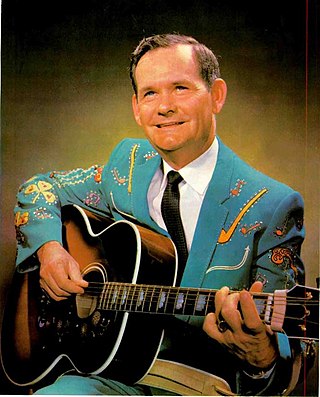
Lawrence Hankins Locklin was an American country music singer-songwriter. He had 70 chart singles, including two number one hits on Billboard's country chart. His biggest hits included "Send Me the Pillow You Dream On" and his signature "Please Help Me, I'm Falling". The latter also went to number eight on the Billboard Hot 100 pop music chart. Billboard's 100th anniversary issue listed it as the second most successful country single of the rock and roll era. It sold over one million copies, and was awarded a gold disc by the RIAA.

The World Is a Ghetto is the fifth album by American band War, released in late 1972 on United Artists Records. The album attained the number one spot on Billboard, and was Billboard magazine's Album of the Year as the best-selling album of 1973. In addition to being Billboard's #1 album of 1973, the album was ranked number 444 on Rolling Stone magazine's original list of the 500 greatest albums of all time. The title track became a gold record.
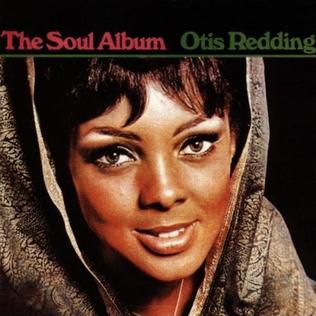
The Soul Album is the fourth studio album by American soul singer-songwriter Otis Redding, released in 1966. It features Redding performing songs that he co-wrote, as well as covers of songs by such musicians as Sam Cooke, Eddie Floyd, Roy Head, and Smokey Robinson. Guitarist Steve Cropper contributed guitar on the album, and is also credited as the co-author of three tracks.

Ultimate! is a comprehensive career retrospective album by English rock group the Yardbirds. The 52-song two–compact disc compilation was released in 2001 by Rhino Records. The tracks span the period from the group's first demo recordings in 1963 to the last singles in 1968. They include all 17 of the group's singles, both A-side and B-sides, supplemented with more than a dozen album tracks, their performance for the film Blow-Up, and three early solo numbers by singer Keith Relf.

"Where Have All the Flowers Gone?" is a folk song written by American singer-songwriter Pete Seeger in 1955. Inspired lyrically by the traditional Cossack folk song "Koloda-Duda", Seeger borrowed an Irish melody for the music, and published the first three verses in Sing Out! magazine. Additional verses were added in May 1960 by Joe Hickerson, who turned it into a circular song. Its rhetorical "where?" and meditation on death place the song in the ubi sunt tradition. In 2010, the New Statesman listed it as one of the "Top 20 Political Songs".

Sunny Side! is an album by the American folk music group the Kingston Trio, released in 1963. It reached number 7 on the Billboard Pop Albums chart. The lead-off single was "Desert Pete" b/w "Ballad of the Thresher". The single was the last Top 40 single for the group. Members of the Western Writers of America chose it as one of the Top 100 Western songs of all time.

"Fanny (Be Tender with My Love)" is a song written and performed by the Bee Gees for their Main Course album in 1975. It was the third single release from the album, peaking at number 12 on the United States Billboard Hot 100 and number two in Canada. According to Maurice Gibb, producer Quincy Jones called "Fanny" one of his favorite R&B songs of all time.

"Just a Little" is a song by the American rock group the Beau Brummels. The song is included on the band's debut album, Introducing the Beau Brummels, and was released as its second single, following "Laugh, Laugh". "Just a Little" became the band's best hit parade U.S. single, which peaked at number eight on the Billboard Hot 100 in June 1965. It also reached no lower than position #10 of the hit parades in Canada and Australia.
"Have Ya Got Any Gum, Chum?" is a big band song written by Murray Kane in 1944. The music and lyrics were registered in the United States Copyright Catalog on February 6, 1945.

Romantically is an album by American pop singer Johnny Mathis that was released on November 18, 1963, by Columbia Records and was also the final original studio album recorded by Mathis for the label prior to his moving to Mercury Records. Mathis had recorded exclusively for Columbia from 1956 to 1963. After a brief stint with Mercury, he returned to Columbia in 1967. His first Mercury project, Sounds of Christmas, was actually released six weeks before this one, on October 4.

Marlene Dietrich's recording career spanned sixty years, from 1928 until 1988. She introduced the songs "Falling in Love Again " and "See What the Boys in the Back Room Will Have". She first recorded her version of "Lili Marlene" in 1945.
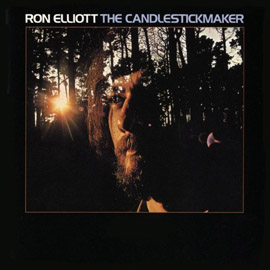
The Candlestickmaker is the lone solo album by American musician Ron Elliott, released in 1970 on Warner Bros. It was recorded following the dissolution of The Beau Brummels, with whom Elliott had been the chief songwriter and guitarist. A two-part, fifteen-minute piece titled "The Candlestickmaker Suite" comprises the entire second side of the album.

Goin' to Memphis is the eighth studio album by American rock band Paul Revere & the Raiders. Produced by Chips Moman, with the exception of one song that was produced by Terry Melcher, the album was released in 1968 and reached number 61 on the U.S. albums chart.

Runaway with Del Shannon is the 1961 debut album by American rock and roll singer-songwriter Del Shannon. It contains Shannon's best-known hit, "Runaway". It is regarded by critics as having helped bridge the period between early rock and the British Invasion.
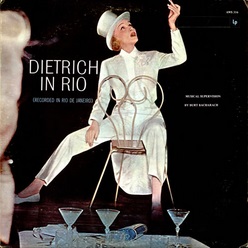
Dietrich in Rio is a live album by Marlene Dietrich, issued on Columbia Records LP, catalogue number WS 316, and reissued on CD by Sony Music Special Products. Though marketed as a "live" album, it likely consists of studio recordings done in New York, overdubbed with applause recorded on tour to create live atmosphere. Four tracks of this album can be heard without the "live" atmosphere on 1991's CD: The Marlene Dietrich Album.

Wiedersehen mit Marlene is a Marlene Dietrich's live album, issued on Electrola, catalogue number 1C 062-28 473 MD, in Germany. The American pressing on Capitol Records does not include "Kinder, heut' abend, da such ich mir was aus".

Live at the Café de Paris is a live album by Marlene Dietrich, recorded in London, at her opening night in Café de Paris on June 21, 1954. The orchestra was conducted by George Smith. Dietrich is introduced by Noël Coward.
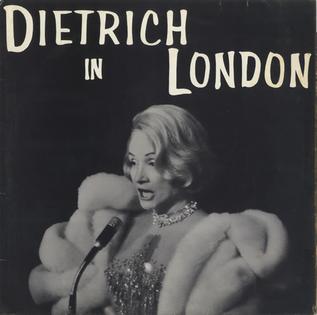
Dietrich in London is a Marlene Dietrich's live album. The album was issued on Columbia Records OS 2830. "Marlene Dietrich in London" opened on November 23, 1964, at the Queen's Theatre. This recording was produced on the closing night, December 12, 1964. The album was released in Australia, by Philips Records in 1965, coincide with her visit in the country.

Something Pretty is a studio album by American country artist Wynn Stewart and his band, The Tourists. It was released in May 1968 via Capitol Records and was produced by Ken Nelson. It was Stewart's fourth studio recording in his music career and contained a total of 12 tracks. Among these tracks was the title cut, which became a major hit on the country charts. The album received a positive response from music publications.


















